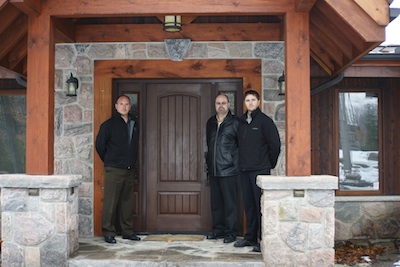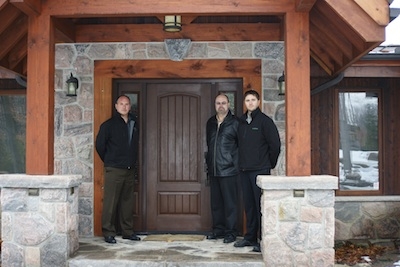
Dec. 10, 2013 – Weber Manufacturing Technologies has announced it is expanding its MasterGrain premium fiberglass residential entry door product line and moving production to Midland. President Chris Edwards said the move means long-term stability and new local jobs at the company. It also opens the door to significant market opportunities for the innovative, fully integrated world class mold maker that already supplies a broad customer base in the aerospace, automotive, and home and building industries.
Dec. 10, 2013 – Weber Manufacturing Technologies has announced it is expanding its MasterGrain premium fiberglass residential entry door product line and moving production to Midland. President Chris Edwards said the move means long-term stability and new local jobs at the company. It also opens the door to significant market opportunities for the innovative, fully integrated world class mold maker that already supplies a broad customer base in the aerospace, automotive, and home and building industries.
MasterGrain was first born in 2007 when Weber’s new ownership restructured and pushed to diversify the company originally founded in 1962. At first, with the low volume of a start-up it made economic sense to source door production from a plant in Mexico but that has changed. “With rising production and logistical costs it’s the right time to bring it home to Midland,” Edwards said. “We are confident we can produce a higher quality product, equally cost effective and support the Canadian economy instead of looking for low cost country alternatives.”
 |
|
| The MasterGrain executive team, from left to right, Chris Edwards, president; Ken Kussen, business manager; Tom Krokos, account and product development manager. Advertisement
|
Ken Kussen, business manager for MasterGrain explained, “The advantage of the MasterGrain product is the fiberglass panel used to build the components look, feel, and stain like real wood. We’ve accurately captured the warmth of wood and its natural variation of grain characteristics in much sought after woods like cherry, fir, mahogany, and knotty alder, giving us a competitive advantage to other door manufacturers. MasterGrain is known in the industry for having the best wood grain replication with the engineering advantage of composites that won’t rot, warp, split, corrode or dent.” Industry experts are predicting fiberglass could reach 50 per cent of US entry door installations and see phenomenal global growth in both the renovation and new home markets.
While doors may initially appear outside Weber’s traditional precision plastics and composite tooling work, Edwards explained it’s really a natural progression using technology pioneered at the plant in the 1990s. “We couldn’t do it without utilizing our core mold making knowledge and unique nickel vapour disposition or NVD technology.”
Weber is home to the world’s largest NVD facility and the only one in the world producing tooling. Edwards said the patented tool making technology lets them replicate fine surface detail using pure nickel to build a shell, molecule by molecule, capturing fine grains and texturing details.
The door tooling starts by building a wood door, a poured silicone casting picks up the fine grain detail which is then transferred to the door mold using NVD technology. The mold is then used to produce fiberglass skins at the Weber facility for the MasterGrain program.
With over $4.6 million in investment to support MasterGrain’s leading edge technology, Edwards is excited with its development and said it has the potential for substantial growth. The technology’s unsurpassed texture reproduction of leather, slate, and other natural materials has multiple applications, for example in automotive interiors.
Most importantly the move to Midland gives Weber ultimate control over molding quality while shortening delivery time and enabling them to quickly respond to special requests. That quality control and flexibility is vital when building a new product’s reputation. “We want to build a brand,” Edwards said. “This is a new industry and has great potential for growth.”
It also provides a much-needed boost to the local economy as Weber is renting 22,000 square feet of space for production and will need to fill a number of skilled and semi-skilled positions. Edwards said, “It’s bringing new opportunities to this area in an exciting and innovative new industry for us.” Since the start of the year, 14 new positions have been added and as Weber moves into stage two of the development, Edwards estimates there will be five to
10 jobs created shortly and over 30 new positions in the next two to three years. Visit www.mastergrain.com to learn more about this unique ‘made in Midland’ product.
Weber Manufacturing Technologies Inc. is a fully integrated mold manufacturer in Automotive Interiors and Exteriors, Aerospace, and Home and Building products. Founded in 1962, Weber builds tooling for spray, slush, compression, injection, RTM, infusion, and autoclave processes. Its in-house model shop develops master models made from leather wrap or select wood grains, and can also provide low cost models in silicone, epoxy, and urethane tooling board. Weber also operates the world ́s largest nickel vapour deposition facility. This facility is capable of producing nickel shapes in 99.98 per cent pure nickel; to high precision, for molds or complex nickel components, including fine
surface detail, grains, and textures. Tools made using NVD nickel shells offer many flexible design options and critical advantages not available with any other tool-making technology.
Innovation and a unique precision product are creating new jobs in Midland.
Just when the area needs it most, Weber Manufacturing Technologies Inc. announced it is expanding its MasterGrain premium fiberglass residential entry door product line and moving production to Midland.
President Chris Edwards said the move means long-term stability and new local jobs at the company. It also opens the door to significant market opportunities for the innovative, fully integrated world class mold maker that already supplies a broad customer base in the aerospace, automotive, and home and building industries.
MasterGrain was first born in 2007 when Weber’s new ownership restructured and pushed to diversify the company originally founded in 1962. At first, with the low volume of a start-up it made economic sense to source door production from a plant in Mexico but that has changed. “With rising production and logistical costs it’s the right time to bring it home to Midland,” Edwards said. “We are confident we can produce a higher quality product, equally cost effective and support the Canadian economy instead of looking for low cost country alternatives.”
Ken Kussen, Business Manager for MasterGrain explained, “The advantage of the MasterGrain product is the fiberglass panel used to build the components look, feel, and stain like real wood. We’ve accurately captured the warmth of wood and its natural variation of grain characteristics in much sought after woods like cherry, fir, mahogany, and knotty alder, giving us a competitive advantage to other door manufacturers. MasterGrain is known in the industry for having the best wood grain replication with the engineering advantage of composites that won’t rot, warp, split, corrode
or dent.” Industry experts are predicting fiberglass could reach 50 per cent of US entry door installations and see phenomenal global growth in both the renovation and new home markets.
While doors may initially appear outside Weber’s traditional precision plastics and composite tooling work, Edwards explained it’s really a natural progression using technology pioneered at the plant in the 1990s. “We couldn’t do it without utilizing our core mold making knowledge and unique nickel vapour disposition or NVD technology.”
Weber is home to the world’s largest NVD facility and the only one in the world producing tooling. Edwards said the patented tool making technology lets them replicate fine surface detail using pure nickel to build a shell, molecule by molecule, capturing fine grains and texturing details.
The door tooling starts by building a wood door, a poured silicone casting picks up the fine grain detail which is then transferred to the door mold using NVD technology. The mold is then used to produce fiberglass skins at the Weber facility for the MasterGrain program.
With over $4.6 million in investment to support MasterGrain’s leading edge technology, Edwards is excited with its development and said it has the potential for substantial growth. The technology’s unsurpassed texture reproduction of leather, slate, and other natural materials has multiple applications, for example in automotive interiors.
Most importantly the move to Midland gives Weber ultimate control over molding quality while shortening delivery time and enabling them to quickly respond to special requests. That quality control and flexibility is vital when building a new product’s reputation. “We want to build a brand,” Edwards said. “This is a new industry and has great potential for growth.”
It also provides a much-needed boost to the local economy as Weber is renting 22,000 square feet of space for production and will need to fill a number of skilled and semi-skilled positions. Edwards said, “It’s bringing new opportunities to this area in an exciting and innovative new industry for us.” Since the start of the year, 14 new positions have been added and as Weber moves into stage two of the development, Edwards estimates there will be five to
10 jobs created shortly and over 30 new positions in the next two to three years. Visit www.mastergrain.com to learn more about this unique ‘made in Midland’ product.
Weber Manufacturing Technologies Inc. is a fully integrated mold manufacturer in Automotive Interiors and Exteriors, Aerospace, and Home and Building products. Founded in 1962, Weber builds tooling for Spray, Slush, Compression, Injection, RTM, Infusion, and Autoclave processes. Our in-house model shop develops Master Models made from leather wrap or select wood grains, and can also provide low cost models in silicone, epoxy, and urethane tooling board. Weber also operates the world ́s largest Nickel Vapour Deposition facility. This facility is capable of producing nickel shapes in 99.98% pure nickel; to high precision, for molds or complex nickel components, including fine surface detail, grains, and textures. Tools made using NVD nickel shells offer many flexible design options and critical advantages not available with any other tool-making technology.
For more information
mastergrain.com
Print this page

Leave a Reply